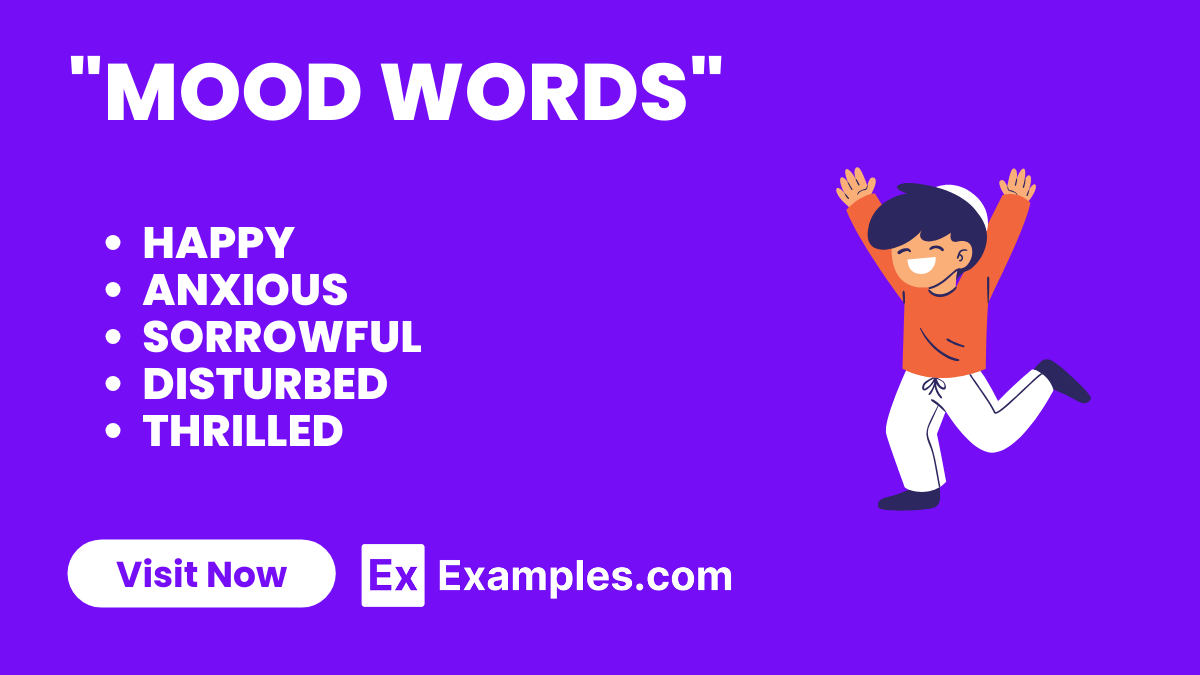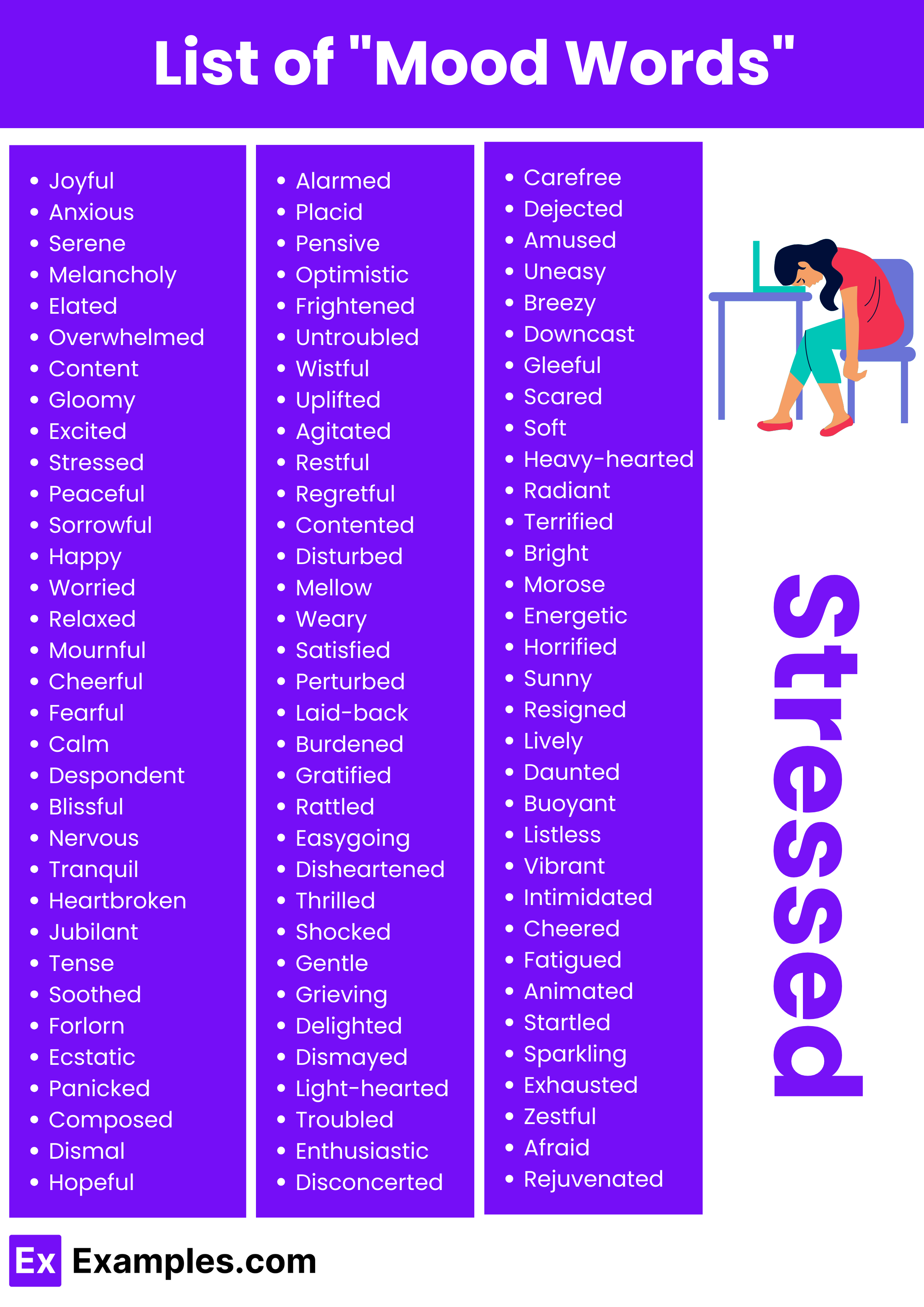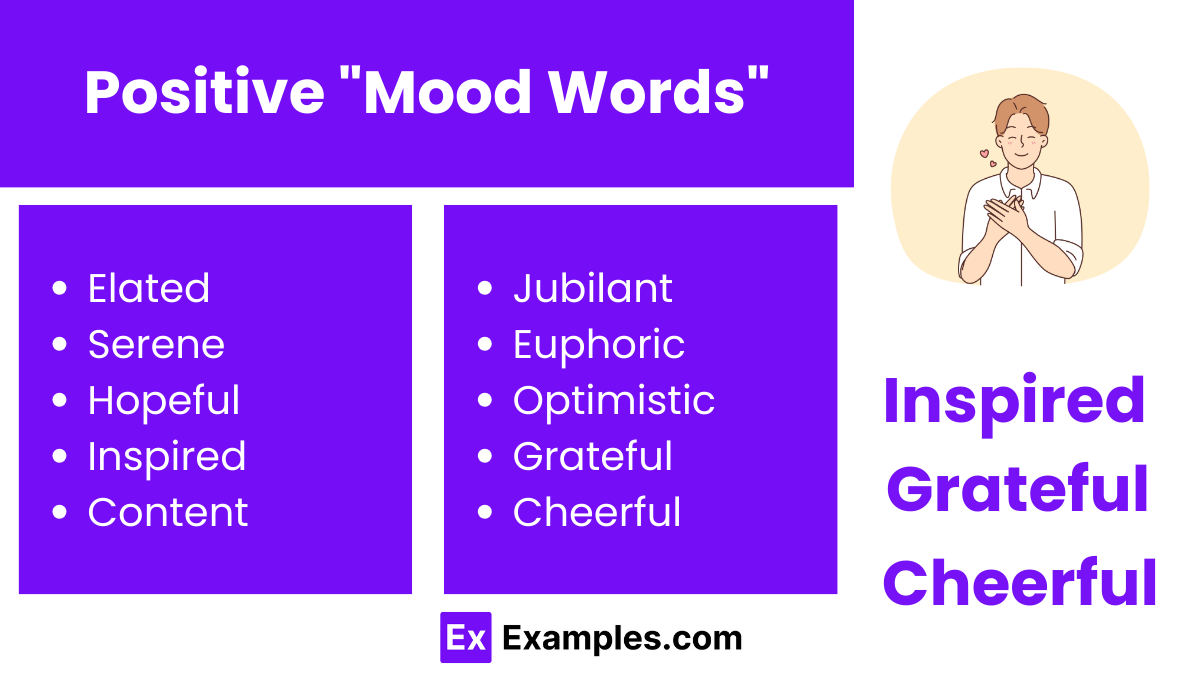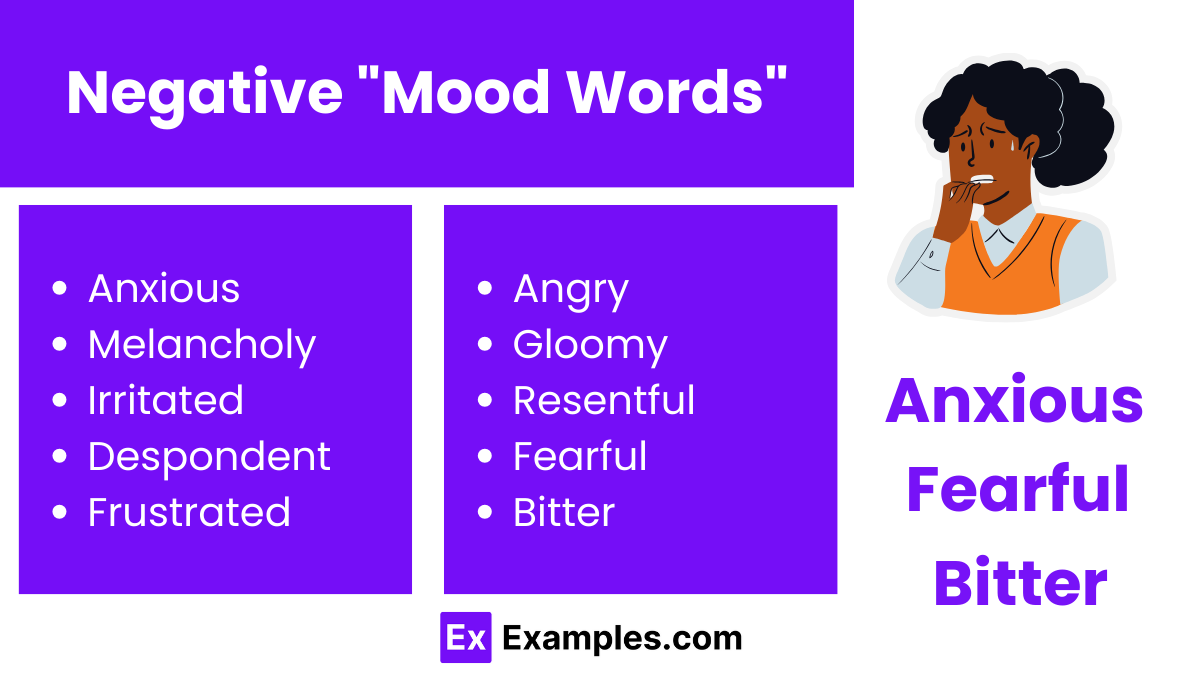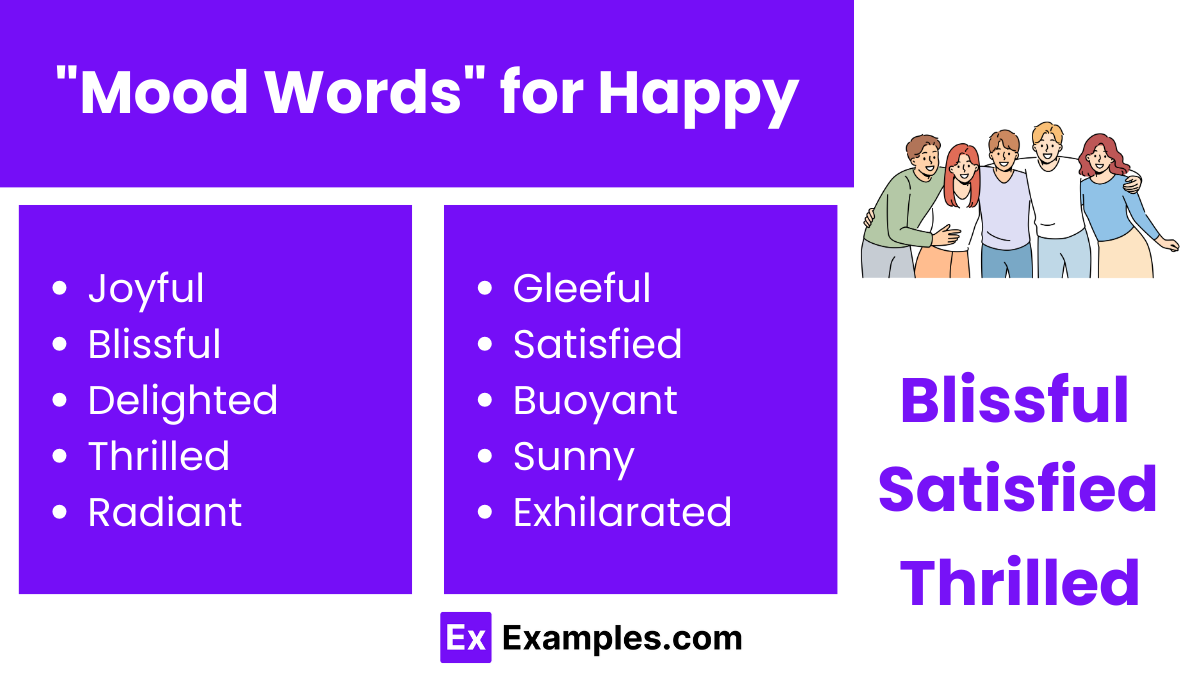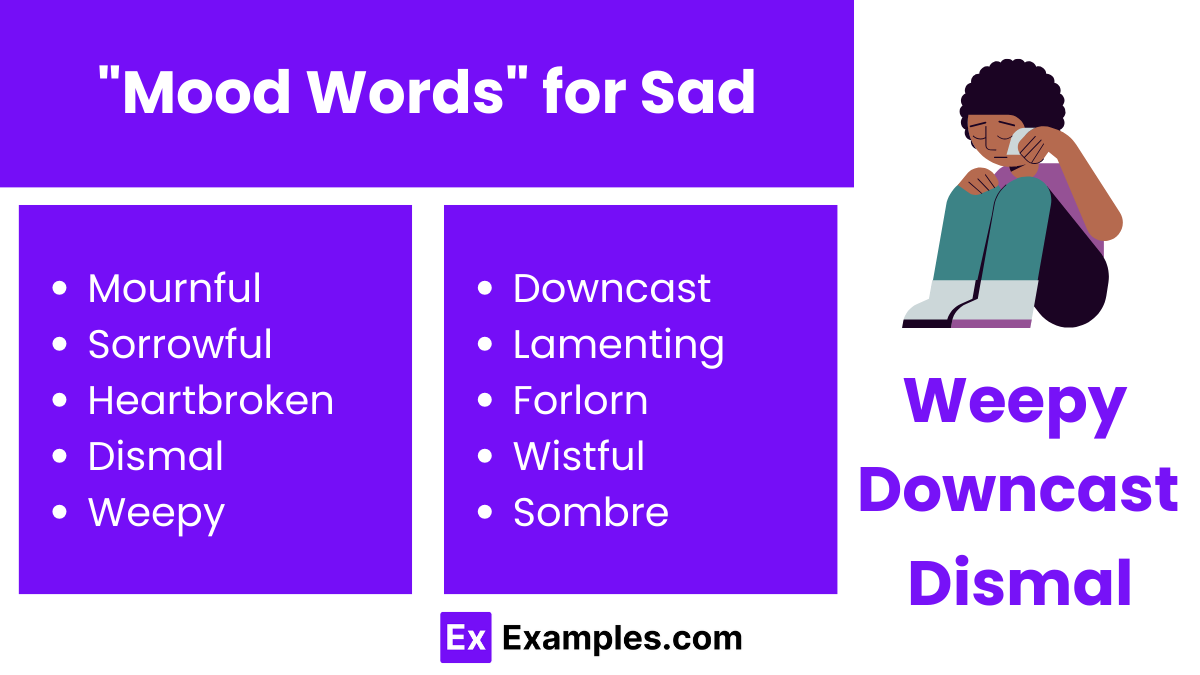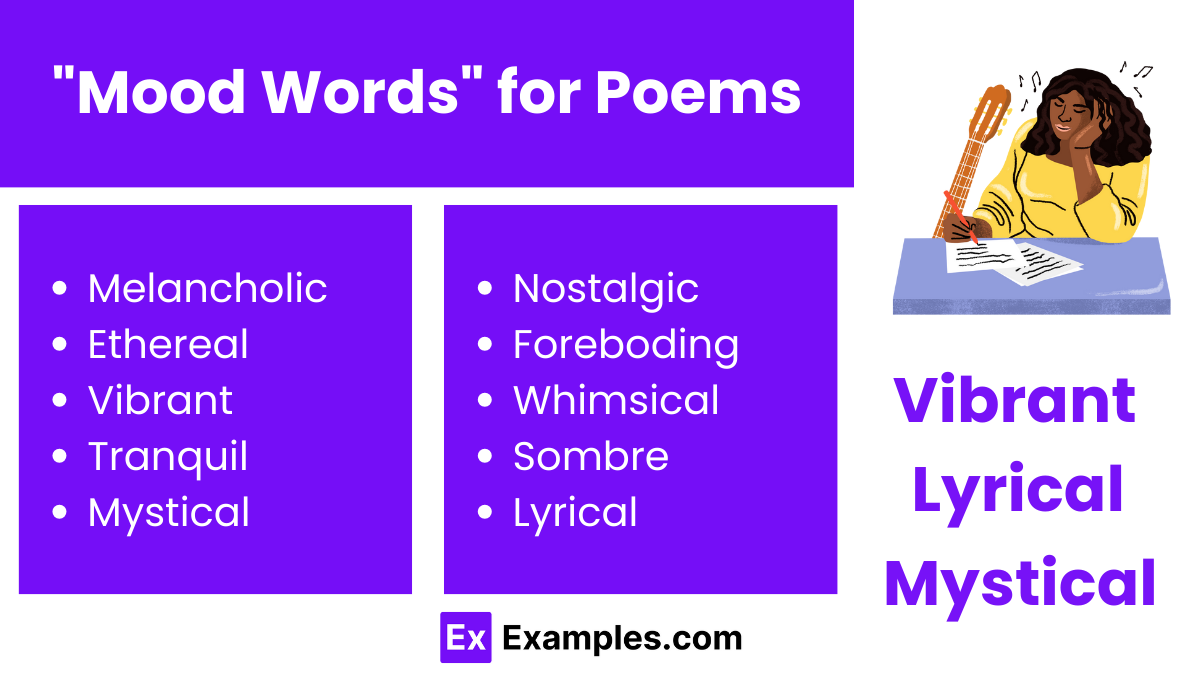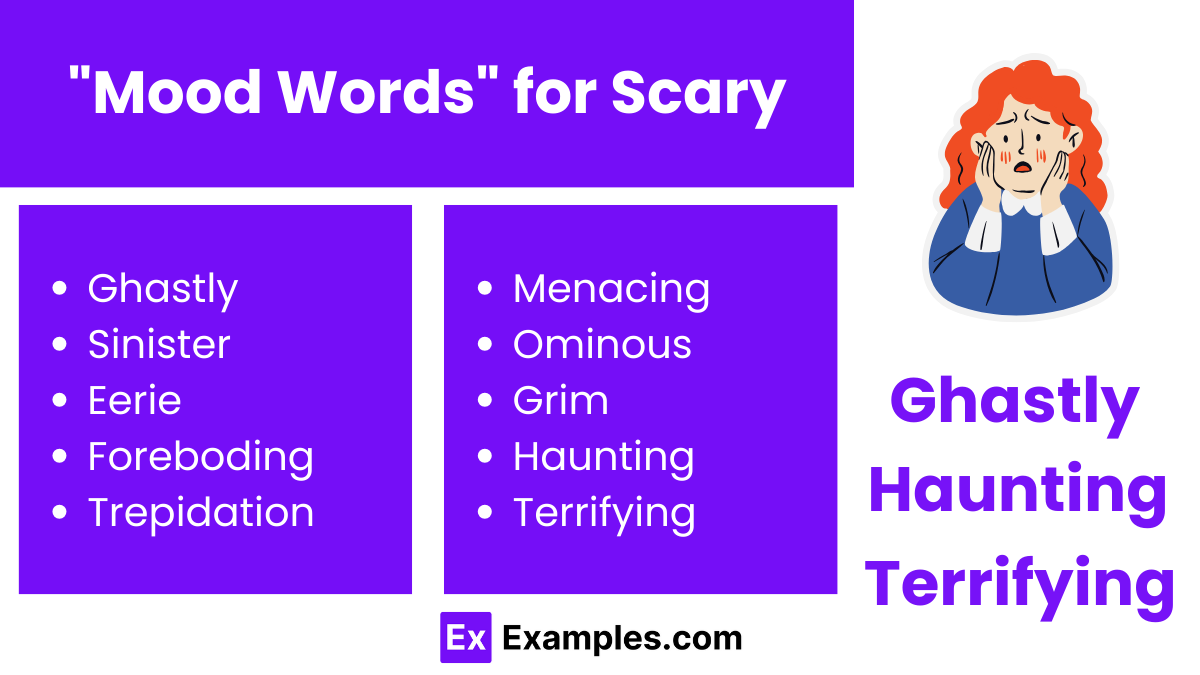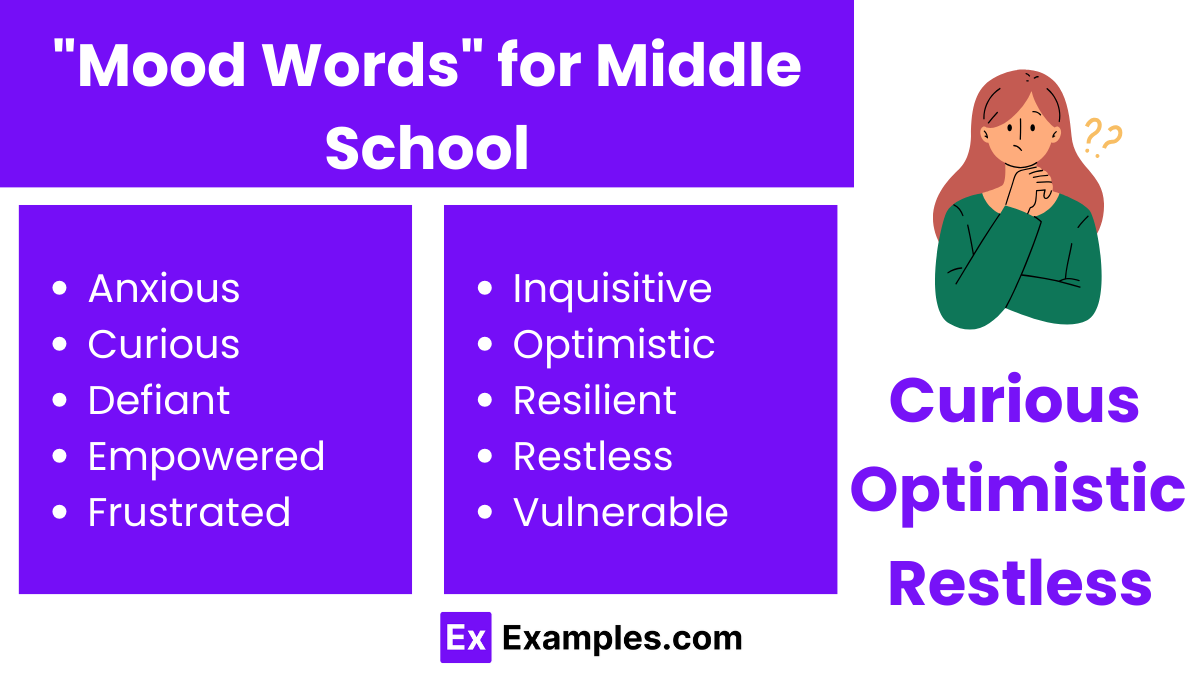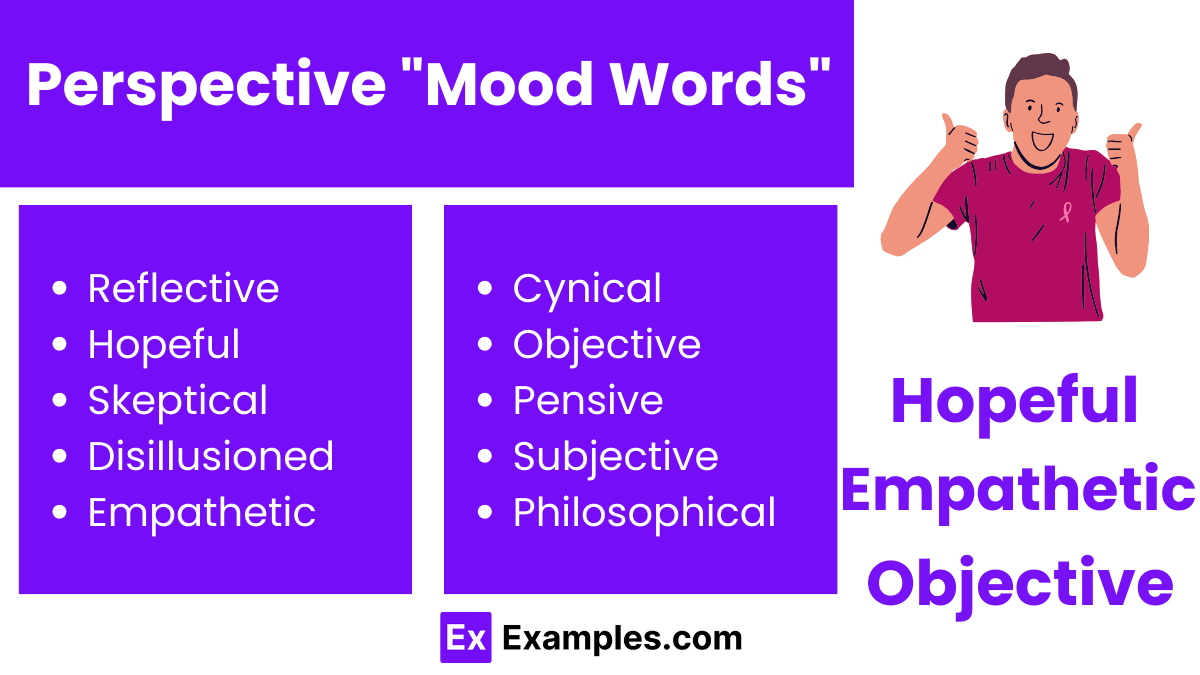“Mood Words”
Mood words serve as the brushstrokes on the canvas of our communication, painting vivid pictures of our internal states for the world to understand. They encapsulate the essence of our feelings, from fleeting moments of bliss to enduring seasons of contemplation. This collection of mood words is a treasure trove for anyone looking to articulate emotions with precision and depth. Whether you’re a creative spirit, an educator, or simply someone keen on exploring the nuances of emotional expression, these words offer a gateway to a more enriched and meaningful dialogue. Dive into this linguistic journey and discover the words that resonate with the very core of human experience.
Download List of Mood Words - PDF
200 List of “Mood Words”
Creating a comprehensive guide to the most commonly used mood words involves delving into the vast spectrum of human emotions. This exploration is not just about identifying feelings but understanding the subtle nuances that differentiate them. Mood words are pivotal for effective communication, allowing us to express our internal states accurately and empathize with others. They are essential tools for writers seeking to evoke specific responses in readers, educators aiming to enhance emotional literacy, and individuals striving for personal growth and better interpersonal relationships. Here is a meticulously curated list of 300 mood words, organized in a table format to provide a broad range of emotional expressions. This collection is designed to enrich vocabulary, foster emotional awareness, and improve emotional expression.
| Joyful | Anxious | Serene | Melancholy |
| Elated | Overwhelmed | Content | Gloomy |
| Excited | Stressed | Peaceful | Sorrowful |
| Happy | Worried | Relaxed | Mournful |
| Cheerful | Fearful | Calm | Despondent |
| Blissful | Nervous | Tranquil | Heartbroken |
| Jubilant | Tense | Soothed | Forlorn |
| Ecstatic | Panicked | Composed | Dismal |
| Hopeful | Alarmed | Placid | Pensive |
| Optimistic | Frightened | Untroubled | Wistful |
| Uplifted | Agitated | Restful | Regretful |
| Contented | Disturbed | Mellow | Weary |
| Satisfied | Perturbed | Laid-back | Burdened |
| Gratified | Rattled | Easygoing | Disheartened |
| Thrilled | Shocked | Gentle | Grieving |
| Delighted | Dismayed | Light-hearted | Troubled |
| Enthusiastic | Disconcerted | Carefree | Dejected |
| Amused | Uneasy | Breezy | Downcast |
| Gleeful | Scared | Soft | Heavy-hearted |
| Radiant | Terrified | Bright | Morose |
| Energetic | Horrified | Sunny | Resigned |
| Lively | Daunted | Buoyant | Listless |
| Vibrant | Intimidated | Cheered | Fatigued |
| Animated | Startled | Sparkling | Exhausted |
| Zestful | Afraid | Rejuvenated | Languid |
| Spirited | Timid | Invigorated | Sluggish |
| Jovial | Hesitant | Refreshed | Sapped |
| Merry | Apprehensive | Revitalized | Drained |
| Upbeat | Skittish | Stimulated | Spent |
| Jolly | Edgy | Motivated | Weakened |
| Playful | Fidgety | Enlivened | Diminished |
| Chirpy | Shaken | Aroused | Worn |
| Lighthearted | Distraught | Awakened | Depleted |
| Carefree | Distracted | Activated | Faded |
| Bright | Frantic | Empowered | Shattered |
| Sunny | Hysterical | Strengthened | Broken |
| Buoyant | Desperate | Bolstered | Crushed |
| Exuberant | Hopeless | Supported | Defeated |
| Gay | Helpless | Encouraged | Overcome |
| Festive | Powerless | Inspired | Overpowered |
| Rejoicing | Vulnerable | Uplifted | Overwhelmed |
| Celebratory | Exposed | Elevated | Swamped |
| Jubilous | Insecure | Fortified | Engulfed |
| Euphoric | Inadequate | Enriched | Flooded |
| Gleaming | Inferior | Nurtured | Submerged |
| Sparkling | Worthless | Cultivated | Drowned |
Positive “Mood Words”
In the vast expanse of human emotion, positive mood words shine as beacons of hope, joy, and inspiration. They capture those moments of pure bliss, profound gratitude, and unwavering optimism that color our lives with happiness. For educators seeking to imbue their teaching with positivity, writers aiming to evoke a sense of serenity, and individuals striving to articulate the warmth in their hearts, these words are invaluable tools. Here’s a list of positive mood words, each a key to unlocking and sharing the most uplifting parts of our experience.
- Elated – Extremely happy and excited.
- Serene – Calm, peaceful, and untroubled.
- Hopeful – Feeling or inspiring optimism about a future event.
- Inspired – Filled with the urge to do something creative.
- Content – In a state of peaceful happiness.
- Jubilant – Feeling great joy and triumph.
- Euphoric – Characterized by or feeling intense excitement and happiness.
- Optimistic – Hopeful and confident about the future.
- Grateful – Feeling or showing an appreciation for something done or received.
- Cheerful – Noticeably happy and optimistic.
Negative “Mood Words”
Conversely, negative mood words articulate the shadows of the human emotional spectrum, encompassing feelings of despair, anxiety, and disenchantment. These words provide a language for the moments of darkness, offering a voice to our innermost fears and frustrations. Essential for educators discussing the complexity of emotions, writers crafting compelling narratives, and individuals needing to express their struggles, these words help to navigate the intricacies of challenging experiences.
- Anxious – Experiencing worry, unease, or nervousness.
- Melancholy – A deep, pensive, and long-lasting sadness.
- Irritated – Showing slight anger; annoyed or vexed.
- Despondent – In low spirits from loss of hope or courage.
- Frustrated – Feeling or expressing distress and annoyance, especially because of inability to change or achieve something.
- Angry – Feeling or showing strong annoyance, displeasure, or hostility.
- Gloomy – Dark or poorly lit, especially so as to appear depressing.
- Resentful – Feeling bitterness or indignation at having been treated unfairly.
- Fearful – Feeling afraid; showing fear or anxiety.
- Bitter – Having a sharp, pungent taste or smell; not sweet.
“Mood Words” for Happy
Happiness, a universally sought-after state, is vividly captured through mood words that reflect the spectrum of joy. These words are the lexicon of elation, encompassing everything from the gentle contentment of a quiet afternoon to the intense joy of a celebrated achievement. For anyone looking to express the lighter, more joyful aspects of life, here are mood words that resonate with happiness.
- Joyful – Feeling, expressing, or causing great pleasure and happiness.
- Blissful – Extremely happy; full of joy.
- Delighted – Feeling or showing great pleasure.
- Thrilled – Very excited and pleased.
- Radiant – Sending out light; shining or glowing brightly, often used metaphorically for happiness.
- Gleeful – Exuberantly or triumphantly joyful.
- Satisfied – Pleased with what has happened or with what one has achieved.
- Buoyant – Cheerful and optimistic.
- Sunny – Cheerful; optimistic.
- Exhilarated – Making someone feel very happy, animated, or elated.
“Mood Words” for Sad
Sadness, an integral part of the human condition, finds its voice in mood words that express the range of sorrow from mild disappointment to profound grief. These words help articulate the feeling of loss, longing, and the reflective melancholy that can accompany life’s downturns. For discussions that delve into the more somber aspects of existence, here are mood words for sad.
- Mournful – Feeling, expressing, or inducing sadness, regret, or grief.
- Sorrowful – Full of or feeling sorrow or sadness.
- Heartbroken – Suffering from overwhelming distress; very upset.
- Dismal – Depressing; dreary.
- Weepy – Tearful or given to weeping.
- Downcast – Feeling despondent; depressed.
- Lamenting – Expressing grief or sorrow.
- Forlorn – Pitifully sad and abandoned or lonely.
- Wistful – Having or showing a feeling of vague or regretful longing.
- Sombre – Dark or dull in color or tone; gloomy.
“Mood Words” for Poems
Poems are a canvas for the soul’s deepest emotions, painted with words that resonate and stir the heart. Choosing the right mood words can transform a simple verse into a profound experience, evoking imagery, emotion, and reflection in the reader. For poets and educators alike, understanding and utilizing mood words is essential to crafting works that speak to the universal human experience. Here’s a list of mood words that frequently find their home within the stanzas of poetry, each one selected for its ability to evoke specific atmospheres and emotions.
- Melancholic – Reflecting deep sadness or longing.
- Ethereal – Extremely delicate and light in a way that seems not of this world.
- Vibrant – Full of energy and enthusiasm.
- Tranquil – Free from disturbance; calm.
- Mystical – Having a spiritual symbolic significance that transcends human understanding.
- Nostalgic – Longing for the past.
- Foreboding – Implying that something bad is going to happen.
- Whimsical – Playfully quaint or fanciful, especially in an appealing and amusing way.
- Sombre – Dark or dull in color or tone; gloomy.
- Lyrical – Expressing the writer’s emotions in an imaginative and beautiful way.
“Mood Words” for Scary
The essence of fear can be captured in the choice of mood words, essential for crafting stories, narratives, or any content aiming to evoke a sense of dread or suspense. These words plunge the reader into the depths of fear, turning the page into a portal to dark, unseen worlds. Here is a selection of mood words perfect for setting a scary tone, each one a tool for drawing the reader closer into the embrace of the eerie and the unknown.
- Ghastly – Causing great horror or fear.
- Sinister – Giving the impression that something harmful or evil is happening or will happen.
- Eerie – Strange and frightening.
- Foreboding – A feeling that something bad will happen.
- Trepidation – A feeling of fear or agitation about something that may happen.
- Menacing – Suggesting the presence of danger; threatening.
- Ominous – Giving the worrying impression that something bad is going to happen.
- Grim – Forbidding or uninviting.
- Haunting – Poignant and evocative; difficult to ignore or forget.
- Terrifying – Causing extreme fear.
“Mood Words” for Middle School
Middle school is a time of transition and growth, where students begin to explore more complex emotions and experiences. The mood words that resonate with middle schoolers reflect their evolving world – a mixture of excitement, uncertainty, and discovery. Educators can use these words to connect with students, enriching their emotional vocabulary and aiding them in expressing their own feelings and stories.
- Anxious – Experiencing worry, unease, or nervousness.
- Curious – Eager to know or learn something.
- Defiant – Showing defiance; bold disobedience.
- Empowered – Confident in one’s abilities and rights.
- Frustrated – Feeling or expressing distress and annoyance.
- Inquisitive – Curious or inquiring.
- Optimistic – Hopeful and confident about the future.
- Resilient – Able to withstand or recover quickly from difficult conditions.
- Restless – Unable to rest or relax as a result of anxiety or boredom.
- Vulnerable – Exposed to the possibility of being attacked or harmed.
Perspective “Mood Words”
Perspective mood words offer a lens through which we view and interpret our experiences, shaping our perception of the world around us. These words encapsulate the attitudes, viewpoints, and emotions that color our interpretation of events, influencing our reactions and decisions. For educators, these words are invaluable for teaching students about empathy, understanding, and the power of perspective in shaping our emotional responses.
- Reflective – Characterized by deep thought or reflection.
- Hopeful – Feeling or inspiring optimism about a future event.
- Skeptical – Not easily convinced; having doubts or reservations.
- Disillusioned – Disappointed in someone or something that one discovers to be less good than one had believed.
- Empathetic – Showing an ability to understand and share the feelings of another.
- Cynical – Believing that people are motivated by self-interest; distrustful of human sincerity or integrity.
- Objective – Not influenced by personal feelings or opinions in considering and representing facts.
- Pensive – Engaged in, involving, or reflecting deep or serious thought.
- Subjective – Based on or influenced by personal feelings, tastes, or opinions.
- Philosophical – Relating or devoted to the study of the fundamental nature of knowledge, reality, and existence.
In conclusion, exploring the realm of mood words provides a linguistic map to navigate the complex terrain of human emotions. From the joyous peaks to the shadowed valleys, these words offer a way to articulate the indescribable, enriching our communication and understanding. This article serves as a guide for educators and students alike, illuminating the path to emotional literacy and fostering a deeper connection with our own feelings and those of others.



